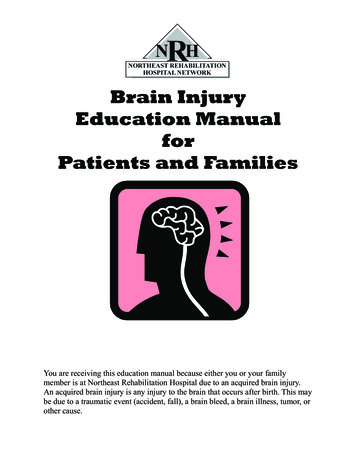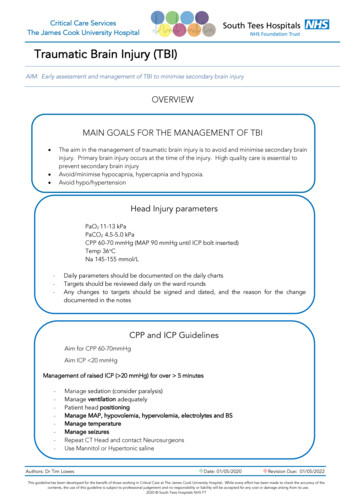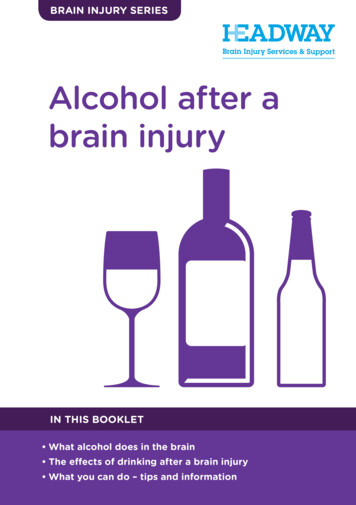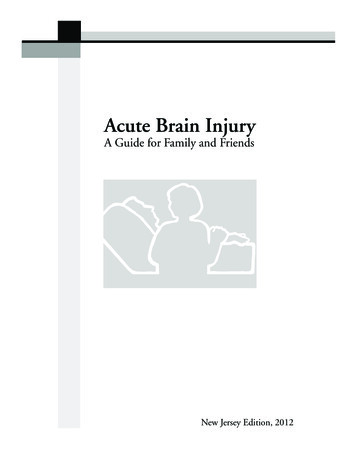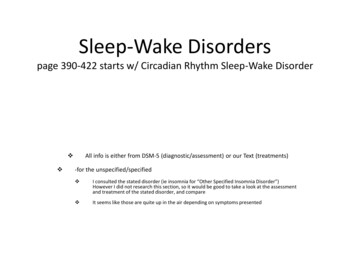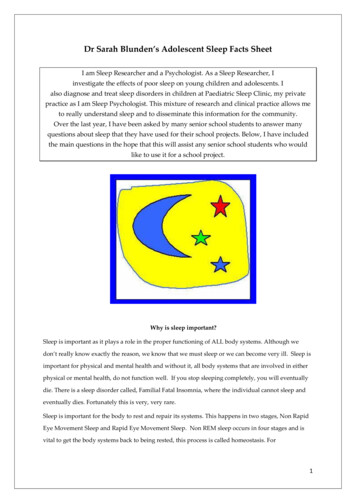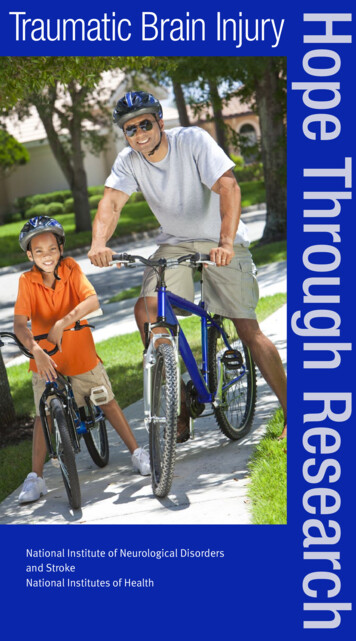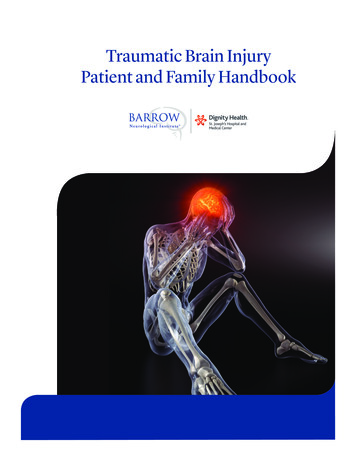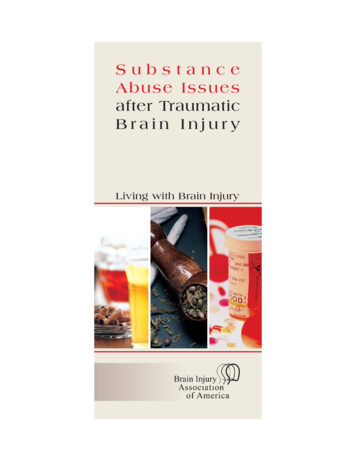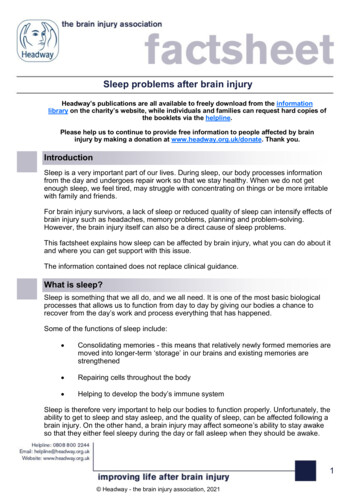
Transcription
Sleep problems after brain injuryHeadway’s publications are all available to freely download from the informationlibrary on the charity’s website, while individuals and families can request hard copies ofthe booklets via the helpline.Please help us to continue to provide free information to people affected by braininjury by making a donation at www.headway.org.uk/donate. Thank you.IntroductionSleep is a very important part of our lives. During sleep, our body processes informationfrom the day and undergoes repair work so that we stay healthy. When we do not getenough sleep, we feel tired, may struggle with concentrating on things or be more irritablewith family and friends.For brain injury survivors, a lack of sleep or reduced quality of sleep can intensify effects ofbrain injury such as headaches, memory problems, planning and problem-solving.However, the brain injury itself can also be a direct cause of sleep problems.This factsheet explains how sleep can be affected by brain injury, what you can do about itand where you can get support with this issue.The information contained does not replace clinical guidance.What is sleep?Sleep is something that we all do, and we all need. It is one of the most basic biologicalprocesses that allows us to function from day to day by giving our bodies a chance torecover from the day’s work and process everything that has happened.Some of the functions of sleep include: Consolidating memories - this means that relatively newly formed memories aremoved into longer-term ‘storage’ in our brains and existing memories arestrengthened Repairing cells throughout the body Helping to develop the body’s immune systemSleep is therefore very important to help our bodies to function properly. Unfortunately, theability to get to sleep and stay asleep, and the quality of sleep, can be affected following abrain injury. On the other hand, a brain injury may affect someone’s ability to stay awakeso that they either feel sleepy during the day or fall asleep when they should be awake.1 Headway - the brain injury association, 2021
How can brain injury affect sleep?Having a brain injury can affect sleep in a number of ways.Injury to parts of the brain involved in sleepIt may be that there is damage in parts of the brain that are directly responsible for sleep.For instance, closed head injuries can cause damage to a part of the brain known as thesuprachiasmatic nucleus (SCN), which controls the circadian rhythm (an internal 24 hourcycle). Another area of the brain known as the basal forebrain is involved in sleepinitiation, and this can be damaged by acceleration/deceleration injuries, such as from aroad traffic collision. Hormones involved in regulating sleep cycles may be affectedfollowing injury to areas such as the hypothalamus.Psychological statesThere is a relationship between stress, depression and anxiety and sleep, so that thesesorts of psychological states commonly experienced after brain injury can cause difficultieswith getting to sleep or affect sleep quality.A brain injury survivor who has post-traumatic stress disorder, for instance if they wereinvolved in a road traffic collision or an assault, may have nightmares while they sleep,which can make them feel bad upon wakening and anxious about going to sleep.Changes in life after brain injuryThe many changes that a brain injury can bring to someone’s life may also preoccupyone’s thoughts so that they struggle with getting to sleep. A survivor may find it difficult tostop thinking about things such whether they can return to work, changes in relationships,financial stresses and their recovery.Effects of brain injuryVarious effects of brain injury may be interfering with the ability to get to or stay asleepthrough the night.Pain such as headaches might make the survivor too uncomfortable to get to sleep.Survivors who experience fatigue in the day time may rely on napping to get through butdepending on the timing and duration of the naps, this may actually cause problems withgetting to sleep at night time.Incontinence may disrupt a survivor’s sleep if they need to use the toilet through the night.MedicationMedication that the survivor is on to cope with the effects of their brain injury may actuallyhave a side effect of disrupting sleep. This information should be contained in yourmedication information leaflet, or you can find information about medications on the NHS2
website at www.nhs.uk/medicines.You should always discuss any concerns aboutmedication with your GP before making changes.Types of sleep problems after brain injuryThis section describes some of the types of sleep problems commonly experienced after abrain injury.Excessive daytime sleepinessThis refers to sleepiness during the daytime to an excessive level. There can be aspontaneous need for sleep so that the person is unable to stay awake, often duringinappropriate times, with no particular cause, and may suddenly fall asleep.InsomniaBeing unable to get to sleep is one of the most common sleep related problems afterbrain injury. This can include finding it hard to get to sleep in the first place, stayingasleep (i.e. waking through the night), waking up too early and being unable to getback to sleep, and feeling tired upon waking. The NHS website offers a test throughSleepio to help with identifying whether you have insomnia, to access this visitwww.nhs.uk/conditions/insomnia/.Unusual dreams/nightmaresIt is not uncommon for people to report changes in the content or quality of theirdreams after brain injury. Some people report having unusual dreams, while othersmay experience nightmares. Dreams may be vivid and difficult to ‘shake off’ uponwaking up, although in some cases they may be harmless and just consideredunusual. Recurring nightmares can be common if someone is suffering frompost-traumatic stress disorder (PTSD) after a traumatic incident; the nightmares maybe of the incident itself or featuring themes around it, or memories of times inhospital.Quality of sleepSome brain injury survivors may sleep through the night or part of the night and stillfeel as though the quality is not the same as before their injury, perhaps making themfeel tired when waking up. They may consistently wake up in the early morning andbe unable to get back to sleep. There may be a general feeling of increased need ofsleep after brain injury - this is known as pleisomnia. In fact, some research indicatesthat following a TBI, patients needed at least 2 more hours of sleep each night thanthey did before their injury.Sleep-related breathing disordersSleep apnoea is where someone stops breathing while they sleep, and may causethe person to snore, make gasping, snorting and choking sounds, or wake frequentlythrough the night. The waking may be in brief but frequent episodes, causing a3
disruption of good quality sleep. It may be difficult to identify these issues if you sleepby yourself, but symptoms can also include feeling tired during the day and aheadache upon waking up. Speak to your GP or neurologist if you are concernedabout sleep apnoea as it can be serious and there are treatments available.Sleep/wake cycle disruptionOur sleep/wake cycles generally tend to follow a 24-hour cycle - this is called our’circadian rhythm’. Following a brain injury, some survivors may have disruptedcircadian rhythms so that they are unable to follow a set pattern for sleeping, andsleeping times become random. There may be difficulty sleeping and waking atparticular, set times, possibly causing the survivor to go to bed late and wake up laterthan they did before their injury.ParasomniasAbnormal movements, talking and actions while sleeping are called parasomnias,and can occur following brain injury. This can include talking in one’s sleep(somniloquy), teeth grinding (bruxism) and dream re-enactment. These issues can beexacerbated by sleep deprivation and fragmented sleep. A person may appear toothers as though they are awake while carrying out these behaviours as they sleep.The effect of these sleep problems is that it can make someone feel tired, irritable andcause difficulties with concentration through the day. Effects of brain injury, especiallycognitive effects such as memory problems and difficulties with planning orproblem-solving may be worsened. These issues can unfortunately make someonestruggle to sleep even more if they cause anxiety, for instance making the survivor worryabout their recovery.Where can I get help for sleep problems?Research has shown that in some cases sleep problems can improve or resolve bythemselves over time. However, as sleep is something that we rely on every day tofunction, it may be necessary to seek professional support with this issue if the tipsprovided in this factsheet further on do not help.Relevant professionalsThere are a number of professionals that may be able to help by first investigating theunderlying case of the sleep problems. For instance, an endocrinologist may be able totest your hormones, while a neuropsychologist or a counsellor may be able to identify andsupport with issues such as depression, anxiety or post-traumatic stress disorder (PTSD).It is advisable in the first instance to speak with your GP or neurologist about your sleepissues, as they may be able to check medications you are on and review these, to seewhether there are any side effects causing the sleep problems, or whether you can beprescribed anything to help with the sleep problems. They may be able to refer you to4
professionals or advise on the suitability of acupuncture, which there is some evidence tosuggest can help with some sleep problems.Cognitive behavioural therapy (CBT) is a form of therapy that has been found to beeffective at improving sleep problems after brain injury in some cases. You can find outmore about CBT on the NHS website. You do not necessarily need a GP referral to accessCBT; if you live in England, you can access NHS’ IAPT (Improving Access toPsychological Therapies) service, although you do still need to be registeredwith a GP to access this. For more information, visit apies-service/.Sleep clinicsIn some instances, it may be possible to get a referral to a sleep clinic. There are not manyof these around the country and waiting lists for referrals can be very long, so it is notalways possible to access them.Sleep clinics can carry out a series of tests while you sleep, checking things such as yourbreathing patterns and brain activity, which can help with identifying problems and guidetreatment. You will need a referral from a GP to visit a sleep clinic, and you will often needto be prepared to remain there overnight while the tests are carried out.Sleep diariesRegardless of which course of professional support you take, it can be helpful to take asleep diary along with you. A sleep diary is a log you can start keeping for a few days orweeks to monitor your sleep activity. Write down details about how much sleep you geteach night, the quality of it, what the sleeping environment was like, timings of sleep, andany daytime symptoms you experience, such as if you were anxious or sleepy through theday. These details can help with identifying sleep patterns and any underlying cases of thesleep problems.Other toolsSleepstation (www.sleepstation.org.uk) is a 6-8 week programme that has been designedto help with sleep problems. You usually do not need a referral from a GP to access theprogramme, however, it may or may not be helpful depending on the nature of your braininjury so you should explore this in some detail and contact Sleepstation to discuss yoursituation first.The NHS MyTherappy website lists apps that have been approved by the NHS. There is adesignated page for sleep apps to help after brain injury that you can browse through ps for improving sleep after brain injuryIn the first instance, and if possible, try to identify what may be causing your sleep5
problems. It might be helpful to start keeping a sleep diary (see previous section), as thismay help to identify things that may be affecting your sleep, such as how you feel duringthe day.Other tips to try include.Managing the effects of brain injury to improve sleep If you are waking through the night from incontinence, try to empty your bladderand bowels just before going to bed every night. You could also try to limit theamount you eat and drink just before going to bed. Speak to your GP or neurologist about taking medication to manage pain suchas headaches, but be aware that some medications can have side effects thatalso affect sleep, so discuss this with your GP as well. You could also have awarm bath before bed to help with managing pain. If you are experiencing psychological issues such as depression, anxiety, stressor post-traumatic stress disorder (PTSD), especially nightmares associated withPTSD, speak to your GP or seek support from a clinical neuropsychologist ortalking therapist such as a counsellor. You could also try techniques such asmindfulness before bed to help you to relax and calm your thoughts. Fatigue is a common effect of brain injury that may make you feeloverwhelmingly tired during the day, especially following periods of activity.While resting is recommended as a way of managing fatigue, try to avoid doingthis in the afternoon as it may disrupt your natural sleep routine at night. If you are sensitive to lights and sounds after your brain injury, consider usingan eye mask to block out light, or ear plugs to minimise noise, which may helpyou to get to sleep.Lifestyle changes Reduce caffeine intake, if possible, especially in the afternoon and evenings.Caffeine is a stimulant so it can affect the ability to sleep. Sleep related hygiene is a term that describes a general set of rules that canhelp to improve sleep. This can include things such as not using electronicdevices and reducing screen time before bed, having a regular sleep routine(waking up and going to bed at the same time), not staying in bed for longerthan necessary after waking up and having a bed time routine. Try to make the room that you sleep in comfortable, clean, warm and ventilated6
You may find that different bedding can help, such as specially shaped pillowsto help with pain or one-sided weakness. Or instead, try re-positioning pillows tohelp with making you feel more comfortable in bed. Disability equipmentproviders can advise on bedroom equipment that may help. Tolerance to alcohol reduces after a brain injury, so it is generally advisable toreduce or avoid drinking alcohol after a brain injury, especially as this can alsoaffect sleep Some types of sleep related issues such as sleep apnoea can be improved withweight loss if you are overweight. Consider discussing this with your GP.Coping during the night If you wake up frequently through the night, try not to check the time constantlyas this can make it feel more difficult to get back to sleep if you notice timepassing slowly If you cannot get back to sleep for a while after waking up, try not to forceyourself to go back to sleep. Instead get up, and do some gentle, light activityfor a short while and then return to bed. Try not to do anything too stimulating atthis time such as watching TV. Try to practice techniques such as mindfulness and breathing exercises whenyou wake up to help you stay relaxed, which may help with getting back tosleep. Try to keep things that you may need through the night at your bedside, such asa drink if you get thirsty or medication. Try not to keep distracting electronicdevices such as your mobile phone beside you unless you really need these. Ifyou do keep your phone beside you, try to avoid opening apps such as gamesor social media during the night.Other suggestions For problems with staying awake during the daytime, consider trying lighttherapy as there is some small evidence to suggest that this can help. Acupuncture is a complementary therapy that may be available to you throughthe NHS and has been found to help with some types of sleep problems afterbrain injury, although improvements may only be small and may not last forlong. For more information about acupuncture, including information aboutsafety and regulation, visit www.nhs.uk/conditions/acupuncture.7
If you are at risk of sleepwalking, seizures during sleep, or dream re-enactment,keep the environment safe before going to bed by clearing away any trippinghazards and locking windows.Above all, remember that sleep problems can sometimes resolve by themselves over time.Where there are persistent problems and it is affecting your quality of life, professionalhelp is available through a number of services and your GP.AcknowledgementsMany thanks to clinical neuropsychologists Dr Kimberley Fletcher (Midlands PartnershipNHS Foundation Trust and The Brain Place Ltd.) and Dr Amanda Mobley (LeicesterPartnership NHS Trust and The Brain Place Ltd.) for their contribution to producing thisfactsheet.To discuss any issues raised in this factsheet, or to find details of our local groupsand branches, please contact the Headway helpline free of charge on 0808 800 2244or by email at helpline@headway.org.uk (Monday - Friday, 9am-5pm).Factsheet published in 2021.8
For brain injury survivors, a lack of sleep or reduced quality of sleep can intensify effects of brain injury such as headaches, memory problems, planning and problem-solving. However, the brain injury itself can also be a direct cause of sleep problems. This factsheet explains how sleep can be affected by brain injury, what you can do about it
